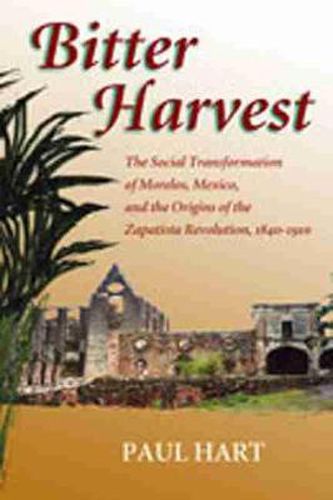Readings Newsletter
Become a Readings Member to make your shopping experience even easier.
Sign in or sign up for free!
You’re not far away from qualifying for FREE standard shipping within Australia
You’ve qualified for FREE standard shipping within Australia
The cart is loading…






Between 1910 and 1919, Morelos, Mexico, was home to a bloody agrarian revolution that saw government troops burn villages, cities stand abandoned, and two of every five people either flee the fighting or die in it. The region’s conflict came in response to a dramatic economic transformation from a peasant economy to the hub of Mexico’s sugar industry during the nineteenth century. The volatile nature of the sugar industry in Morelos, and the silver and cattle industries of the North, exacerbated the social problems created by an exclusionary political regime. Soon, displaced peasants, small farmers, disgruntled ranch hands, and unemployed miners joined Francisco Villa in northern Mexico, while peasants, farmers, and sugar workers rallied around the leadership of Emiliano Zapata in Morelos. When President Porfirio Diaz and the revolutionary leaders who succeeded him resisted the call for deep social change, turmoil engulfed much of the nation for the next decade. In the end, the Zapatistas were defeated militarily, yet they still forced major concessions out of the national government, which helped shape Mexican society for the rest of the twentieth century.
$9.00 standard shipping within Australia
FREE standard shipping within Australia for orders over $100.00
Express & International shipping calculated at checkout
Between 1910 and 1919, Morelos, Mexico, was home to a bloody agrarian revolution that saw government troops burn villages, cities stand abandoned, and two of every five people either flee the fighting or die in it. The region’s conflict came in response to a dramatic economic transformation from a peasant economy to the hub of Mexico’s sugar industry during the nineteenth century. The volatile nature of the sugar industry in Morelos, and the silver and cattle industries of the North, exacerbated the social problems created by an exclusionary political regime. Soon, displaced peasants, small farmers, disgruntled ranch hands, and unemployed miners joined Francisco Villa in northern Mexico, while peasants, farmers, and sugar workers rallied around the leadership of Emiliano Zapata in Morelos. When President Porfirio Diaz and the revolutionary leaders who succeeded him resisted the call for deep social change, turmoil engulfed much of the nation for the next decade. In the end, the Zapatistas were defeated militarily, yet they still forced major concessions out of the national government, which helped shape Mexican society for the rest of the twentieth century.